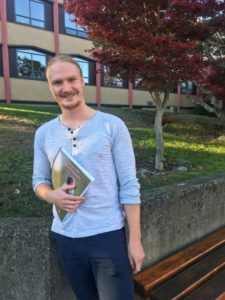The Camosun College Student Society (CCSS) held its fall elections from October 23 to October 25. This was the second round of elections where voting was conducted online, and it resulted in another voter turnout larger than the CCSS usually gets in its elections.
Of 9,431 eligible student voters, 960 voted; during its last elections, the CCSS hit an all-time high of 1,223 voters. Those elections had a referendum question; elections with a referendum often get a higher voter turnout, says CCSS executive director Michel Turcotte.

“For a regular election, 10 percent is a great turnout,” says Turcotte. “Going by historical norms, often this election would have only had a few hundred voters. I would almost entirely attribute this to the online voting. Every student who has an email registered with the college received an email inviting them to vote. I think that’s the main cause.”
Katelynne Herchak was voted in as the new First Nations director, and Shauna Nedelec is the new off campus director. Joel Satre and Jordan Johnson are now Lansdowne directors, and Margarita Saldana, Abhishek Gupta, and Dylan Bystedt are Interurban directors. Saldana is also the Interurban Education Council student representative; Mitchell Auger-Langejan is the Lansdowne Camosun College Board of Governors student representative.
Auger-Langejan was also elected as the CCSS external executive. The external executive represents students at provincial and national meetings to talk about and vote on policies that impact post-secondary students.
“I’ll be advocating for open-access textbooks, because I think that many textbooks for many courses could be provided at a much cheaper cost, or free,” says Auger-Langejan. “That will be my main goal. I also do want to try to advocate for the control of tuition rate hikes. My intent is to make school as affordable and accessible to as many people as possible, considering that in many ways it is a necessity to get access to a job market that is very competitive.”
Auger-Langejan says that he was excited to find out that he won, and that he put a lot of work into his platform going into the election.
“I feel like I put a lot of effort into figuring out what exactly what I wanted to do with my platform, and I think I made a clear one,” he says. “And I was really happy with the results. I’m really proud of it.”
It’s important for students to vote in these elections, says Auger-Langejan, so they can decide who is making decisions on their behalf.
“If they don’t vote, they don’t get the choice that they should have deciding who represents them when they go to those meetings and who votes on decisions for them,” he says. “I think they’d want to vote if they want to have the right person— in their opinion—for them.”
Auger-Langejan says that 960 out of 9,431 students voting is not a number that “is fully pleasing” to him; he’d like to see at least 50 percent of students voting.
“Student politics does affect students,” he says. “I think many students don’t realize that it is actually a fairly big deal to them and that the student politics that take place across the country and the people who run for those positions do affect their experience at the school. Taking the opportunity to vote for the candidates that help do that allows them to have a say in their education.”
Turcotte met many of the candidates and says that they “all seemed to be great, passionate individuals.” He says the race for the position of external executive, which had three students running in it, was a particularly interesting one to watch.
“If you look at the first round of that process, they were all very close,” he says. “I think any of those three candidates would have made a wonderful external for the Camosun College Student Society, and I invite the two candidates that were not successful to try to get one of the vacancies that we’re going to be appointing probably at the first meeting in November.”
Turcotte says that because students are the ones who get to decide who is voted onto the student society board, they should participate in the democratic process of voting. He says that because the student society has an influence over things that go on at the college, and how student money is spent, it’s important for students to get involved.
“The student society funds a lot of things,” says Turcotte. “It organizes events for students and needs to be in touch with students, and therefore students should pay attention to what’s going on and participate in those democratic processes. But, more than that, the Camosun College Student Society has influence on the college and how the college does things. So, by participating in the democratic process that the student society has, students can have greater influence in what goes on around them.”
